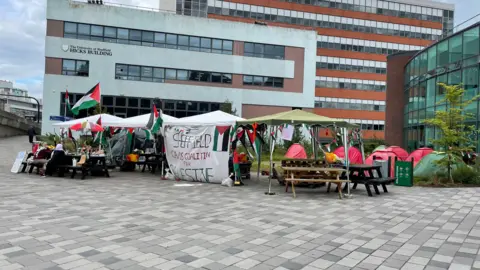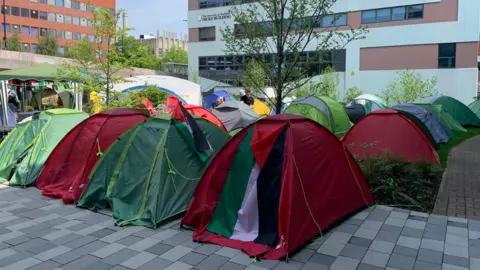UK
Court allows university to clear Gaza protest camp17 hours ago
Share
Victoria Scheer
BBC News Online

BBC/Thomas Macdougall
Sheffield University said it had requested protesters to leave on several occasions
A university has been given legal powers to evict a pro-Palestinian encampment from its campus.
Activists set up outside the University of Sheffield's students' union in May to protest against what it said was the university's "complicity" in the Israel-Gaza war due to its links with arms firms.
The university said it had requested protesters to leave on several occasions due to health and safety concerns and the disruption caused to staff and students.
On Friday, a possession order was granted by a judge at Sheffield County Court.
The hearing was told the group, called the Sheffield Campus Coalition for Palestine (SCCP), did not have permission for the encampment and had been trespassing.
The university said it had allowed the camp to remain "in the interests of freedom of speech", but said requests concerning health and safety had "largely been ignored".
It added that there had also been disruption to university events and damage to buildings on the site, alongside "misleading AI-generated audio and footage".
The SCCP said their encampment, which was set up on 1 May, had been a "place of inspiration, growth, love and safety" for those "heartbroken" by the Israel-Gaza war which followed the Hamas attack on Israel in October.
That attack saw about 1,200 people killed and more than 250 kidnapped and taken hostage in Gaza.
Israel subseqently launched air attacks and then a sustained ground offensive.
More than 39,170 people have been killed in Gaza since then, according to the territory’s Hamas-run health ministry.
The SCCP said since the establishment of the camp on the University of Sheffield campus, it had been a central hub for activism and had hosted protests, sit-ins, workshops, religious observances and community dinners.
As part of their protest, the SCCP called on the university to sever its ties with arms manufacturers and to boycott Israeli companies and institutions.
The SCCP accused the university of "prioritising its profits over basic morality" and said it had not acknowledged its demands or agreed to a meeting.

Sheffield University said it had requested protesters to leave on several occasions
A university has been given legal powers to evict a pro-Palestinian encampment from its campus.
Activists set up outside the University of Sheffield's students' union in May to protest against what it said was the university's "complicity" in the Israel-Gaza war due to its links with arms firms.
The university said it had requested protesters to leave on several occasions due to health and safety concerns and the disruption caused to staff and students.
On Friday, a possession order was granted by a judge at Sheffield County Court.
The hearing was told the group, called the Sheffield Campus Coalition for Palestine (SCCP), did not have permission for the encampment and had been trespassing.
The university said it had allowed the camp to remain "in the interests of freedom of speech", but said requests concerning health and safety had "largely been ignored".
It added that there had also been disruption to university events and damage to buildings on the site, alongside "misleading AI-generated audio and footage".
The SCCP said their encampment, which was set up on 1 May, had been a "place of inspiration, growth, love and safety" for those "heartbroken" by the Israel-Gaza war which followed the Hamas attack on Israel in October.
That attack saw about 1,200 people killed and more than 250 kidnapped and taken hostage in Gaza.
Israel subseqently launched air attacks and then a sustained ground offensive.
More than 39,170 people have been killed in Gaza since then, according to the territory’s Hamas-run health ministry.
The SCCP said since the establishment of the camp on the University of Sheffield campus, it had been a central hub for activism and had hosted protests, sit-ins, workshops, religious observances and community dinners.
As part of their protest, the SCCP called on the university to sever its ties with arms manufacturers and to boycott Israeli companies and institutions.
The SCCP accused the university of "prioritising its profits over basic morality" and said it had not acknowledged its demands or agreed to a meeting.

BBC/Lucy Ashton
The encampment as pictured outside the students' union building on the campus on 8 May
On Friday, Judge Mark Gargan gave the university the right to regain control of campus land, saying there were no less intrusive measures to clear the camp.
He added that there had been no evidence to show the university had been motivated by the protesters' religious beliefs.
Following the conclusion of the hearing, a spokesperson for the University of Sheffield said: “The camp has been outside of our Students’ Union building since 1 May and is raising a number of health and safety concerns, as well as causing ongoing disruption to university activities and our community.
"As a result, we sought to obtain a possession order. This has been granted today (Friday) and requires the protesters to draw the camp to a close.”
This is not the first time a court has granted possession orders in relation to protest encampments.
Similar cases involved the University of Bristol and the University of Nottingham, as reported by the BBC earlier this month.
The SCCP said it was "disheartened" by the outcome of the hearing, but said members remained "steadfast in their commitment to raising awareness and advocating for Palestinian liberation".
One member said: "The university’s decision to evict us does not erase the 87 days that we have spent in this space, organising together, eating together and learning from each other.
"It has made me proud to witness the dedication of the students, staying up night after night, tirelessly organising events on behalf of the SCCP and going out of their way to make the wider community feel welcomed and included."
The university had taken legal action against "persons unknown" as it had been unable to identify protesters.
The SCCP said the decision by members to not defend themselves in court was reached based on fears that named defendants would face high legal fees and "potentially severe disciplinary measures".
Follow BBC Yorkshire on Facebook, X (formerly Twitter) and Instagram. Send your story ideas to yorkslincs.news@bbc.co.uk.
On Friday, Judge Mark Gargan gave the university the right to regain control of campus land, saying there were no less intrusive measures to clear the camp.
He added that there had been no evidence to show the university had been motivated by the protesters' religious beliefs.
Following the conclusion of the hearing, a spokesperson for the University of Sheffield said: “The camp has been outside of our Students’ Union building since 1 May and is raising a number of health and safety concerns, as well as causing ongoing disruption to university activities and our community.
"As a result, we sought to obtain a possession order. This has been granted today (Friday) and requires the protesters to draw the camp to a close.”
This is not the first time a court has granted possession orders in relation to protest encampments.
Similar cases involved the University of Bristol and the University of Nottingham, as reported by the BBC earlier this month.
The SCCP said it was "disheartened" by the outcome of the hearing, but said members remained "steadfast in their commitment to raising awareness and advocating for Palestinian liberation".
One member said: "The university’s decision to evict us does not erase the 87 days that we have spent in this space, organising together, eating together and learning from each other.
"It has made me proud to witness the dedication of the students, staying up night after night, tirelessly organising events on behalf of the SCCP and going out of their way to make the wider community feel welcomed and included."
The university had taken legal action against "persons unknown" as it had been unable to identify protesters.
The SCCP said the decision by members to not defend themselves in court was reached based on fears that named defendants would face high legal fees and "potentially severe disciplinary measures".
Follow BBC Yorkshire on Facebook, X (formerly Twitter) and Instagram. Send your story ideas to yorkslincs.news@bbc.co.uk.
No comments:
Post a Comment